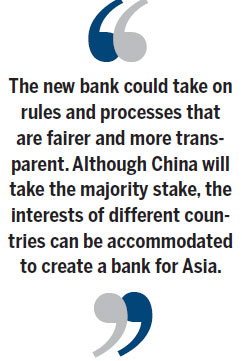Asian bank will not just be China's domain
Updated: 2014-10-31 09:46
By Simon Tay(China Daily Europe)
|
|||||||||||

Giving special recognition to ASEAN and floating public bonds would signal nation's intention to help region
China has launched the Asian Infrastructure Investment Bank with the conspicuous absence of the United States and its major allies. With China hosting the Asia-Pacific Economic Cooperation summit in November, this issue is coming to a boil.
The US' absence should not surprise. The bank proposal runs against the established regional and global order, in which the US dominates the World Bank while the Japanese traditionally head the Asian Development Bank.
Yet such arrangements, based on history, fail to reflect the reality of China's current and still growing economic weight. The existing banks also seem unable to meet the real needs for infrastructure across Asia, both now and in the future.
From now to 2020, it has been estimated that Asia needs $8 trillion for infrastructure. Indonesia alone is said to need $230 billion. The Greater Mekong subregion, linking less developed parts of Vietnam, Laos, Cambodia and Thailand, is estimated to need about $50 billion.
The new bank, with startup capital of $50 billion, is therefore important and necessary. Indeed, China's financing of neighboring countries projects is already dominant. Yet many projects have generated accusations that China is buying political influence and is giving insufficient consideration to social and environmental protection. Construction of the China-supported Myitsone dam in Myanmar, for example, has been stopped because of such fears.
The new bank could take on rules and processes that are fairer and more transparent. Although China will take the majority stake, the interests of different countries can be accommodated to create a bank for Asia.

But this depends on the countries that participate in the new bank. As such, the US efforts to keep countries out could be counterproductive. It would be better to have countries such as South Korea and Australia take part and weigh in on the rules to govern the new bank. While they were absent at the launch, it will not be too late to have them join. Similarly, Japan must consider taking part.
While Sino-Japanese tensions have risen over territorial and other issues, both are economically interdependent. Both are deeply engaged with ASEAN and the wider region. There are also precedents in Sino-Japanese cooperation on economic issues.
One is the ASEAN+3 Macroeconomic Research Office, a small but key institution to monitor regional financial stability. This followed the ASEAN+3 currency swap agreements under the Chiang Mai Initiative Multilateralization, which now has some $240 billion pledged, the bulk of it equally from China and Japan.
If the Japanese do not directly participate in the bank, another option is to develop cooperation through the Japanese-led Asian Development Bank. The region would benefit if both banks coordinate their efforts and work together. Efforts are being made to bring the leaders of Asia's two largest economies together, and their agenda would benefit from a discussion on the modalities for cooperation between the two banks.
Another step to signal China's intention to help the region would be to allow a special recognition for ASEAN collectively. Such recognition would be consistent with Beijing's repeated assurances that it recognizes and supports the group's centrality. This would be significant, notwithstanding the fact that some poorer members cannot contribute much to the bank's share capital.
Another key to make a better bank is to float public bonds and other market instruments for infrastructure funding. Such a move would bring at least two benefits. First, the deep pockets of private savings across Asia could be mobilized, on top of government funds. Second, since private investors seek returns, there would be greater market disciplines and due diligence in determining which projects get the green light.
For China, such moves would further the internationalization of the yuan. While the new bank will have its headquarters in China, the best placed financial centers to take up this role would be Hong Kong and Singapore, both of which can tap regional and global capital, and both of which are also renminbi clearing centers.
What about US objections? Some will remember how, during the Asian financial crisis of 1997-98, Washington persuaded Japan and others not to support calls for an Asian monetary fund. However, the reality today is that, given the real needs for infrastructure, a simple "No" will no longer suffice.
If US allies - and even the US itself - join this initiative, Beijing could not dominate as some fear. Instead, all could join to create a truly Asian bank to help build not just infrastructure, but cooperation across the region.
The author is chairman of the Singapore Institute of International Affairs and an associate professor teaching international law at the National University of Singapore. The views do not necessarily reflect those of China Daily.
(China Daily European Weekly 10/31/2014 page11)
Today's Top News
Russia 'willing' to co-op with Ukrainian parliament
China to help build Ebola quarantine center in Liberia
Tycoons' gift to Yale stirs debate
180 'foxes' hunted back to China
UN chief deplores planned elections in E Ukraine
Overhaul of anti-graft legislation on the way
Germany to bid for 2024 Olympics
Russia to build railroads in DPRK
Hot Topics
Lunar probe , China growth forecasts, Emission rules get tougher, China seen through 'colored lens', International board,
Editor's Picks

|

|

|

|

|

|





